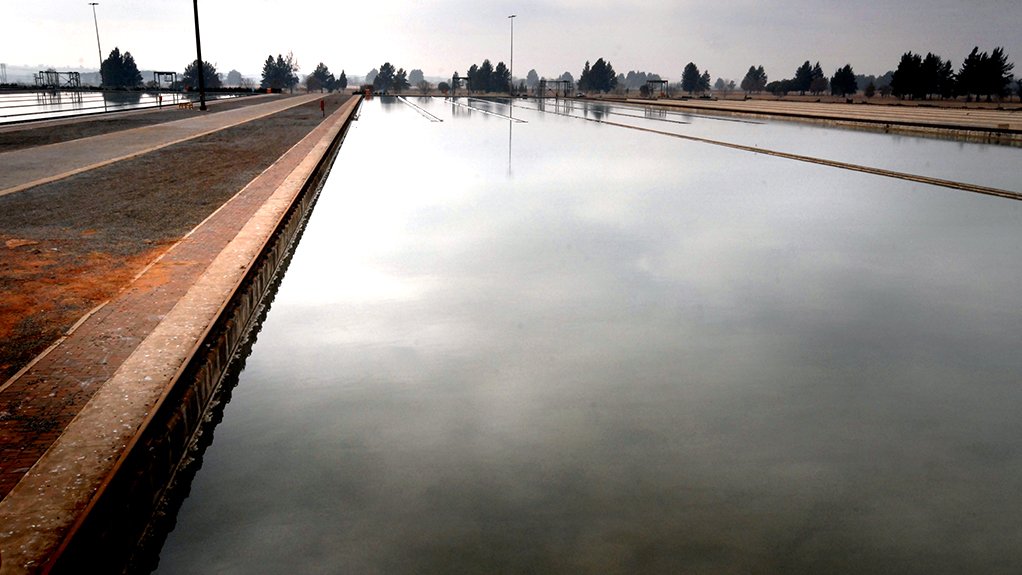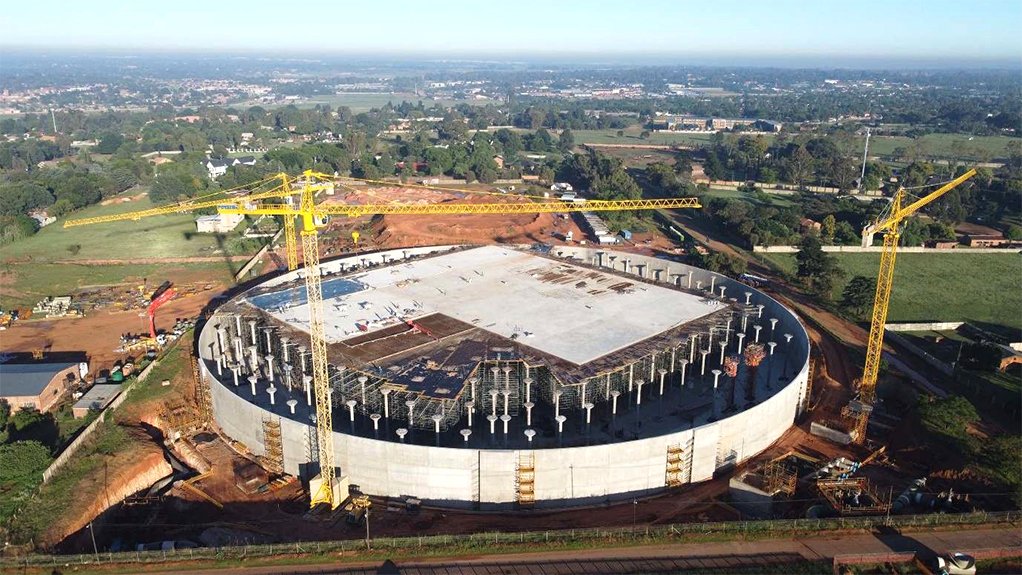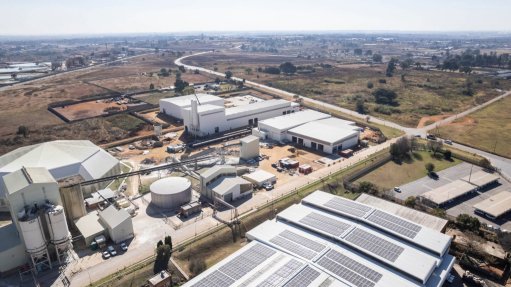Power outages dimming water supply efficiency



BLUER PASTURES Rand Water has created a WaterWise programme to not only raise awareness of water shortages in South Africa but also educate individuals on how to conserve water on a daily basis
VLAKFONTEIN RESERVOIR Rand Water is building additional reservoirs to assist in adding additional capacity for water storage
Purification works and booster stations are expected to be exempt from loadshedding; however, the recent power outages across bulk water utility Rand Water’s entire value chain have created challenges for the utility to pump water regularly.
Rand Water CE Sipho Mosai says, with Rand Water being a “24/7 for 365 days” company, the use of electricity is not only extensive but also continuous.
“In a period of six months, Rand Water uses about 1 562 MW at a cost of just under R2-billion worth of electricity.”
Another factor that compromises Rand Water’s efficiency is cable theft and infrastructure vandalism. The Mapleton System, that supplies water to the Pretoria East, Ekurhuleni, Victor Khanye, Thembisile Hani, Govan Mbeki and Lesedi municipalities, was subjected to a 12-hour power outage last month owing to these factors.
This impacts largely on the ability to be a “24/7 business” as no water was pumped during this period, he adds.
Consequently, Rand Water has been aligning its environmental, social and corporate governance strategies to provide trusted and guaranteed water services to clients, Mosai says.
He explains that the utility is looking towards implementing renewable energy to cater for all the requirements of Rand Water’s electrical facilities: “Four sites have already been identified, designed and released, which sees the company planning to install turbines so that kinetic energy can be converted into electrical energy”.
The utility’s short-term goals are to invest periodically in hydropower. Tertiary booster stations are currently powered by diesel generators and Rand Water is currently rolling out a few more diesel generators at primary booster stations to act as a “cushion” during high stages of loadshedding.
Moreover, Rand Water is also looking at inviting independent power producers, as well as awarding tenders for solar photovoltaic power across its entire value chain, to assist in alleviating dependency on State-owned power utility Eskom.
Mosai mentions that Rand Water’s operational routine has also been impacted because of loadshedding.
Before loadshedding, the company pumped water as much as it could during off-peak times to alleviate the cost of pumping water during peak hours. However, currently, Rand Water’s pumping capacity is no longer determined by cost savings but rather by loadshedding, he outlines.
“Rand Water is extremely restricted when it comes to water pumping, as the company now has to follow certain timeframes – this has had a serious and detrimental impact on the residents for whom we provide water.”
In addition, Mosai says there is now an additional concern – the longevity of mechanical and engineering equipment: “Maintenance interventions and emergency processes have exponentially increased, as the equipment was not manufactured to withstand multiple power outages.”
Water Challenges
Mosai says the country has been crippled even more by floods, droughts and protracted heat waves, which, in return, have also dampened water supply. Water that has been secured in reservoirs that is supposed to last for a specific time completely runs out within a week of use, owing to either high consumption and/or heat waves and droughts.
To combat climate vulnerability, Rand Water needs to be proactive – which means creating water supply and water security for all areas of South Africa, he declares.
“There was about 600 Mℓ/d of water coming through by the tail-end of this year at Zuikerbosch purification works in Vereeniging – known as Station 5A,” which Mosai says will provide an adequate amount of water supply to its consumers in Gauteng and parts of the Free State, Mpumalanga and North West.
Rand Water is also building additional reservoirs to assist in adding additional capacity for water storage – a new 210 Mℓ reservoir was built and launched last month in Vlakfontein, Johannesburg.
“Rand Water is aware of high lying areas in parts of Gauteng that have been experiencing intermittent water supply during heat waves and power outages – the municipalities are intervening by building additional booster pumps, as well as additional storage reservoirs to assist these areas.
He adds that it is vital to look at implementing various new mechanisms to upgrade ageing infrastructure and to invest in building water storage systems to not only provide water but also ensure efficiencies.
“There are about 17-million people in our area of operation. We produce 5 000 Mℓ/d of water, which is sufficient; however, owing to the inefficiency downstream, the water is lost as a result of non-revenue water.”
Water Research Commission research indicates that the average person uses about 300 ℓ/d of water against a world average of 173 ℓ/d, which, in turn, adds to the pressures of ensuring adequate water supply, notes Mosai.
Therefore, Rand Water has created a WaterWise programme to not only raise awareness of water shortages in South Africa but also educate individuals on how to conserve water on a daily basis.
Article Enquiry
Email Article
Save Article
Feedback
To advertise email advertising@creamermedia.co.za or click here
Comments
Press Office
Announcements
What's On
Subscribe to improve your user experience...
Option 1 (equivalent of R125 a month):
Receive a weekly copy of Creamer Media's Engineering News & Mining Weekly magazine
(print copy for those in South Africa and e-magazine for those outside of South Africa)
Receive daily email newsletters
Access to full search results
Access archive of magazine back copies
Access to Projects in Progress
Access to ONE Research Report of your choice in PDF format
Option 2 (equivalent of R375 a month):
All benefits from Option 1
PLUS
Access to Creamer Media's Research Channel Africa for ALL Research Reports, in PDF format, on various industrial and mining sectors
including Electricity; Water; Energy Transition; Hydrogen; Roads, Rail and Ports; Coal; Gold; Platinum; Battery Metals; etc.
Already a subscriber?
Forgotten your password?
Receive weekly copy of Creamer Media's Engineering News & Mining Weekly magazine (print copy for those in South Africa and e-magazine for those outside of South Africa)
➕
Recieve daily email newsletters
➕
Access to full search results
➕
Access archive of magazine back copies
➕
Access to Projects in Progress
➕
Access to ONE Research Report of your choice in PDF format
RESEARCH CHANNEL AFRICA
R4500 (equivalent of R375 a month)
SUBSCRIBEAll benefits from Option 1
➕
Access to Creamer Media's Research Channel Africa for ALL Research Reports on various industrial and mining sectors, in PDF format, including on:
Electricity
➕
Water
➕
Energy Transition
➕
Hydrogen
➕
Roads, Rail and Ports
➕
Coal
➕
Gold
➕
Platinum
➕
Battery Metals
➕
etc.
Receive all benefits from Option 1 or Option 2 delivered to numerous people at your company
➕
Multiple User names and Passwords for simultaneous log-ins
➕
Intranet integration access to all in your organisation



















